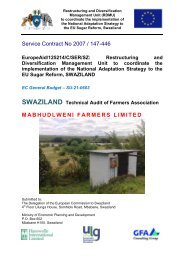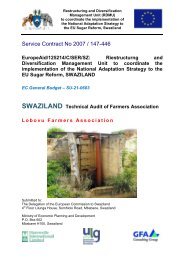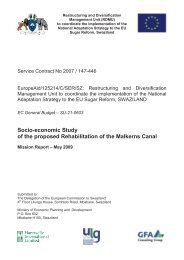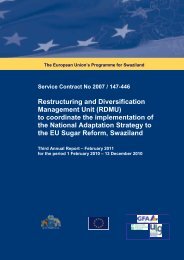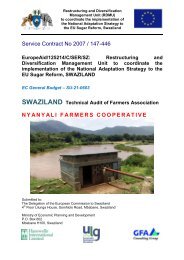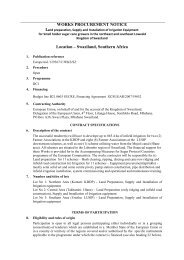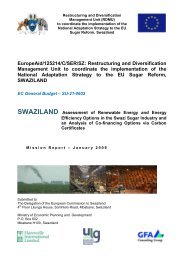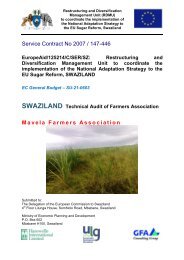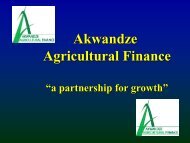Service Contract No 2007 / 147-446 Strategic ... - Swaziland
Service Contract No 2007 / 147-446 Strategic ... - Swaziland
Service Contract No 2007 / 147-446 Strategic ... - Swaziland
- No tags were found...
You also want an ePaper? Increase the reach of your titles
YUMPU automatically turns print PDFs into web optimized ePapers that Google loves.
Annex 10: Terms of ReferenceTERMS OF REFERENCEFor the assignment of an <strong>Strategic</strong> Environment Assessment Study for the <strong>Swaziland</strong>National Adaptation Strategy (NAS)1 BACKGROUND<strong>Swaziland</strong> has an agricultural based economy, for which the sugar sector plays an importantrole. Sugar is also a key raw material for the agro-processing manufacturing sector. Thesugar industry can be segmented into three parts: sugar cane growing, milling andmarketing. Whilst the millers through large estates have predominantly undertaken sugarcane growing, the last decade has seen the entry of more medium and small-scale farmers.This was due to the lucrative economies of sugar cane growing as opposed to otheragricultural activities. Recent developments have come to challenge this scenario. Therecent European Union (EU) sugar sector reforms are a significant factor in the shift ofdynamics. The sucrose price (paid to the sugar cane farmer) is a function of the final(average) sugar price obtainable from sales to different markets.<strong>Swaziland</strong> has historically depended on the EU market for its sugar sales (through the EU-ACP Sugar Protocol), wherein <strong>Swaziland</strong> was selling about a quarter of its output at pricesabout three times the world market price. Given this high exposure, the EU reformschallenge the very viability of the sugar industry in <strong>Swaziland</strong>. This is more pronounced forsmallholder sugar cane growers who are facing several challenges, making their operationsmarginally viable at the obtaining prices, and even more precarious under the mid-termoutlook.In order to adjust to the EU Sugar Market Organisation, <strong>Swaziland</strong> has prepared a NationalAdaptation Strategy (NAS) which is a response to the declining performance of the sugarsector and is in particular a mitigation measure against the negative effects on the sugarsector and the wider economy that will result from the reform of the European Union sugarmarket (EU Sugar Market Organisation). The NAS foresees activities and investments to befunded amounting to € 350 million.The European Commission seeks to support <strong>Swaziland</strong> in the process of adaptation to theSugar Market Organisation by co-financing important components of the NAS. One importantcontribution the EC will make within this adaptation process is the financing of the RDMUwhich is a semi-autonomous project implementation unit being in charge of the coordinationand facilitation of the NAS implementation. Apart from the RDMU, a major fundingcontribution of the European Commission puts emphasis on the following three focal areas:• Improving the efficiency and cost effectiveness of the Swazi sugar sector along the valuechain (farmers, transporters, sugar factories and export);• Facilitating diversification resulting in less dependency on the sugar sector;• Supporting the decentralisation and outsourcing of services up to now provided by thesugar sector.Further to the EC’s Response Strategy to the NAS, a Multi-annual Indicative Programme tocover programmes for the period <strong>2007</strong>-10 has been developed. In it, assistance tosmallholder farmers as well as major stakeholders of the sugar sector have been prioritisedRDMU (<strong>Strategic</strong> Environmental Assessment of the National Adaptation Strategy) - Page 189



